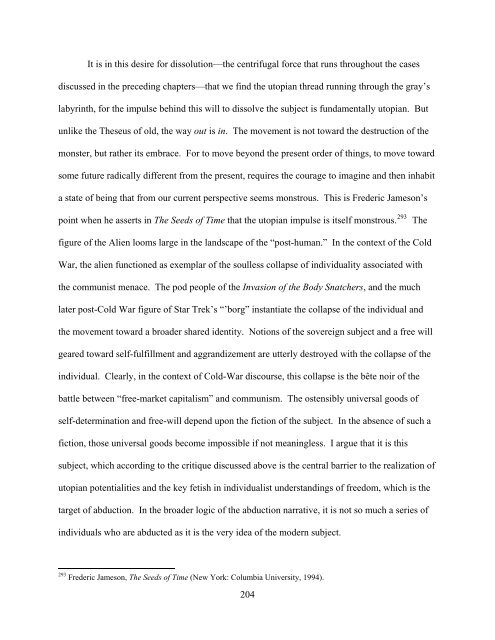A Genealogy of the Extraterrestrial in American Culture
A Genealogy of the Extraterrestrial in American Culture
A Genealogy of the Extraterrestrial in American Culture
You also want an ePaper? Increase the reach of your titles
YUMPU automatically turns print PDFs into web optimized ePapers that Google loves.
It is <strong>in</strong> this desire for dissolution—<strong>the</strong> centrifugal force that runs throughout <strong>the</strong> cases<br />
discussed <strong>in</strong> <strong>the</strong> preced<strong>in</strong>g chapters—that we f<strong>in</strong>d <strong>the</strong> utopian thread runn<strong>in</strong>g through <strong>the</strong> gray’s<br />
labyr<strong>in</strong>th, for <strong>the</strong> impulse beh<strong>in</strong>d this will to dissolve <strong>the</strong> subject is fundamentally utopian. But<br />
unlike <strong>the</strong> Theseus <strong>of</strong> old, <strong>the</strong> way out is <strong>in</strong>. The movement is not toward <strong>the</strong> destruction <strong>of</strong> <strong>the</strong><br />
monster, but ra<strong>the</strong>r its embrace. For to move beyond <strong>the</strong> present order <strong>of</strong> th<strong>in</strong>gs, to move toward<br />
some future radically different from <strong>the</strong> present, requires <strong>the</strong> courage to imag<strong>in</strong>e and <strong>the</strong>n <strong>in</strong>habit<br />
a state <strong>of</strong> be<strong>in</strong>g that from our current perspective seems monstrous. This is Frederic Jameson’s<br />
po<strong>in</strong>t when he asserts <strong>in</strong> The Seeds <strong>of</strong> Time that <strong>the</strong> utopian impulse is itself monstrous. 293<br />
The<br />
figure <strong>of</strong> <strong>the</strong> Alien looms large <strong>in</strong> <strong>the</strong> landscape <strong>of</strong> <strong>the</strong> “post-human.” In <strong>the</strong> context <strong>of</strong> <strong>the</strong> Cold<br />
War, <strong>the</strong> alien functioned as exemplar <strong>of</strong> <strong>the</strong> soulless collapse <strong>of</strong> <strong>in</strong>dividuality associated with<br />
<strong>the</strong> communist menace. The pod people <strong>of</strong> <strong>the</strong> Invasion <strong>of</strong> <strong>the</strong> Body Snatchers, and <strong>the</strong> much<br />
later post-Cold War figure <strong>of</strong> Star Trek’s “’borg” <strong>in</strong>stantiate <strong>the</strong> collapse <strong>of</strong> <strong>the</strong> <strong>in</strong>dividual and<br />
<strong>the</strong> movement toward a broader shared identity. Notions <strong>of</strong> <strong>the</strong> sovereign subject and a free will<br />
geared toward self-fulfillment and aggrandizement are utterly destroyed with <strong>the</strong> collapse <strong>of</strong> <strong>the</strong><br />
<strong>in</strong>dividual. Clearly, <strong>in</strong> <strong>the</strong> context <strong>of</strong> Cold-War discourse, this collapse is <strong>the</strong> bête noir <strong>of</strong> <strong>the</strong><br />
battle between “free-market capitalism” and communism. The ostensibly universal goods <strong>of</strong><br />
self-determ<strong>in</strong>ation and free-will depend upon <strong>the</strong> fiction <strong>of</strong> <strong>the</strong> subject. In <strong>the</strong> absence <strong>of</strong> such a<br />
fiction, those universal goods become impossible if not mean<strong>in</strong>gless. I argue that it is this<br />
subject, which accord<strong>in</strong>g to <strong>the</strong> critique discussed above is <strong>the</strong> central barrier to <strong>the</strong> realization <strong>of</strong><br />
utopian potentialities and <strong>the</strong> key fetish <strong>in</strong> <strong>in</strong>dividualist understand<strong>in</strong>gs <strong>of</strong> freedom, which is <strong>the</strong><br />
target <strong>of</strong> abduction. In <strong>the</strong> broader logic <strong>of</strong> <strong>the</strong> abduction narrative, it is not so much a series <strong>of</strong><br />
<strong>in</strong>dividuals who are abducted as it is <strong>the</strong> very idea <strong>of</strong> <strong>the</strong> modern subject.<br />
293 Frederic Jameson, The Seeds <strong>of</strong> Time (New York: Columbia University, 1994).<br />
204















